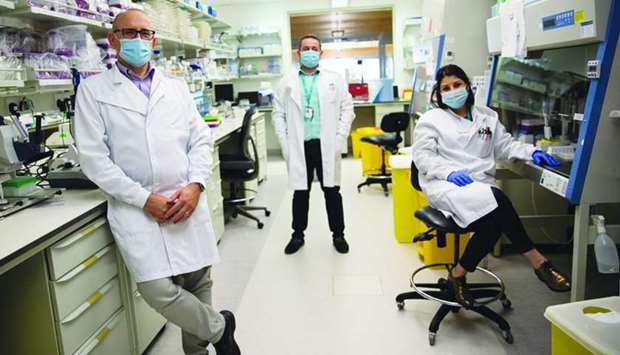Scientists at Qatar Foundation’s Sidra Medicine are working on developing a better antibody test that provides more detailed information than existing commercial assays for Covid-19 antibodies.
This is expected to make life easier during the pandemic times by identifying and certifying people who have developed immunity to the virus, making them safer candidates for travel and work.
"Immunity passports" is a huge area of interest for governments and researchers alike .The idea is that someone who has already recovered from Covid-19 develops antibodies to the virus that will remain in their body for at least a few months. This means they are much less likely to be re-infected and develop symptoms from the virus, making them safer candidates for travel and work.
However, the use of immunity passports has been hampered partly by inaccurate testing. A false positive antibody test in a person who is not immune may lead that individual to believe that they are immune and engage in high-risk activities that may lead to a true infection. A false negative antibody test may cause an individual, who is already immune, to be unnecessarily re-screened for the virus for travel or work-related purposes.
The test that scientists at Sidra Medicine are working looks at multiple types of antibodies against the different protein components of the Covid-19 virus, as well as against the other common human coronaviruses.
The test is also high-throughput and, because it has been developed locally, less expensive than all commercially available tests. The preliminary results show that the test developed by Sidra Medicine is much more accurate than the currently available antibody tests and provides more detailed information about each person’s immune response.
But does this mean that those who test positive for antibodies against other coronaviruses could also be immune to Covid-19? Or potentially face milder symptoms or be asymptomatic? “That’s the million-dollar question,” says Dr Jean-Charles Grivel, director at the Deep Phenotyping Core at Sidra Medicine whose team is working on the new serology assay.
“There are seven human coronaviruses. Our assay measures reactivity against all of them, unlike most commercial assays. We are working with other entities in Qatar to figure out if antibodies to other coronaviruses impacts immunity and how it affects the clinical trajectory of infected patients.”
Dr Grivel’s team at the Deep Phenotyping Core consists of Igor Pavlovski and Selma Maacha who have been instrumental in conducting the research for Sidra Medicine’s serological tests.
Dr Patrick Tang, division chief, Pathology Sciences at Sidra Medicine said that if this test can be applied to a larger population, it would definitely improve the accuracy of the results.
“Commercially available serology tests have an accuracy rate of about 85 to 90%. If we had a more accurate serology test, we have a greater degree of assurance about who is immune and not likely to become symptomatic if exposed to the virus again. This would mean that these people would be safe for customer-facing duties, or to travel or participate in public gatherings and group activities,” added, Dr Tang.
"Immunity passports" is a huge area of interest for governments and researchers alike .The idea is that someone who has already recovered from Covid-19 develops antibodies to the virus that will remain in their body for at least a few months. This means they are much less likely to be re-infected and develop symptoms from the virus, making them safer candidates for travel and work.
However, the use of immunity passports has been hampered partly by inaccurate testing. A false positive antibody test in a person who is not immune may lead that individual to believe that they are immune and engage in high-risk activities that may lead to a true infection. A false negative antibody test may cause an individual, who is already immune, to be unnecessarily re-screened for the virus for travel or work-related purposes.
The test that scientists at Sidra Medicine are working looks at multiple types of antibodies against the different protein components of the Covid-19 virus, as well as against the other common human coronaviruses.
The test is also high-throughput and, because it has been developed locally, less expensive than all commercially available tests. The preliminary results show that the test developed by Sidra Medicine is much more accurate than the currently available antibody tests and provides more detailed information about each person’s immune response.
But does this mean that those who test positive for antibodies against other coronaviruses could also be immune to Covid-19? Or potentially face milder symptoms or be asymptomatic? “That’s the million-dollar question,” says Dr Jean-Charles Grivel, director at the Deep Phenotyping Core at Sidra Medicine whose team is working on the new serology assay.
“There are seven human coronaviruses. Our assay measures reactivity against all of them, unlike most commercial assays. We are working with other entities in Qatar to figure out if antibodies to other coronaviruses impacts immunity and how it affects the clinical trajectory of infected patients.”
Dr Grivel’s team at the Deep Phenotyping Core consists of Igor Pavlovski and Selma Maacha who have been instrumental in conducting the research for Sidra Medicine’s serological tests.
Dr Patrick Tang, division chief, Pathology Sciences at Sidra Medicine said that if this test can be applied to a larger population, it would definitely improve the accuracy of the results.
“Commercially available serology tests have an accuracy rate of about 85 to 90%. If we had a more accurate serology test, we have a greater degree of assurance about who is immune and not likely to become symptomatic if exposed to the virus again. This would mean that these people would be safe for customer-facing duties, or to travel or participate in public gatherings and group activities,” added, Dr Tang.

